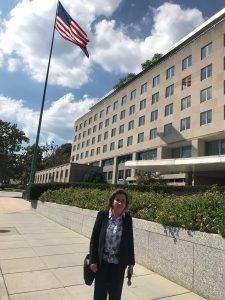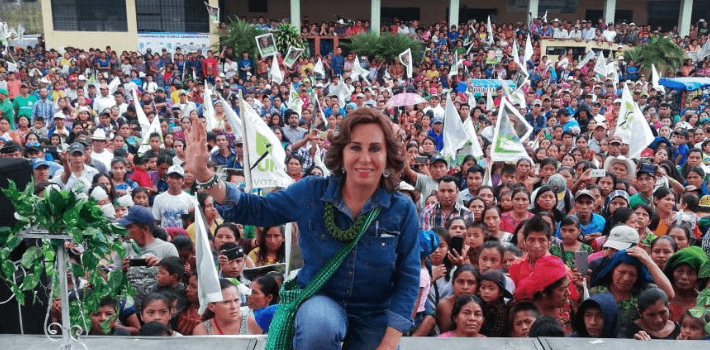On Sunday, Secretary of State Mike Pompeo stated the US desire for Venezuela to be an independent, sovereign state with democratically elected officials. His underlings have been promoting just the opposite in Guatemala, siding with allies of the people who brought Venezuela to its knees.
Guatemala is a conservative country with common-sense people, particularly its indigenous population. They have always rejected collectivism at the ballot box. A collectivist candidate, therefore, will always lose to someone perceived as right of center in a runoff.
With a statist tilt of their own, the permanent bureaucracy of the US foreign service know this, and they have manipulated Guatemala’s electoral process to favor collectivists. Their tool, funded by US taxpayers, has been the UN International Commission Against Impunity in Guatemala (CICIG). President Jimmy Morales expelled the nefarious CICIG earlier this year for its meddling and criminality, which contrasted with its purported mission.
Even from outside the country, the CICIG looms large over Guatemala, and its effect on the judiciary remains. Collectivists still recognize the CICIG authority and continue its agenda.
The CICIG, a hostile foreign entity, has entered into an illegal agreement with the Supreme Electoral Tribunal (TSE). This agreement allows the CICIG to oversee the campaigns, voting procedures, and media regulation. None of this fits the original CICIG mandate, and the TSE has no legal authority to sign or carry out a CICIG agreement.
Former US Ambassador to Guatemala Todd Robinson backed a 2016 electoral law, with the threat of CICIG persecution for noncompliant legislators. It established stiff penalties for campaigning prior to official convocation. The law also reduced the campaign period to three months and limited campaign spending.
This sounds reasonable, but only if applied impartially, which it’s not. More discretionary power to judicial and electoral authorities over campaigns plays into the hands of the National Unity of Hope (UNE) party, the favorite of State Department officials. UNE is the largest party in Guatemala with the most name recognition and resources already on hand.
US Ambassador Luis Arreaga, who took his position in 2017, has behind the scenes rubbed salt into the wound. He has intimidated Guatemala’s leading companies and their shareholders away from contributing to political parties.

There is hardly any money available, except for Sandra Torres of the UNE party. Torres has been campaigning for four years, and she has and spends copious amounts of money. The TSE only applies the legal limits to her opponents.
Torres also happens to be a former guerrilla, vice president of Socialist International, and first lady (2008–2012). Her then-president husband even granted Guatemala’s highest civilian award to Fidel Castro.
Wayward US officials want to overcome the strong sentiment against Torres with the Guatemalan public. For Torres to win the presidential election, she must have a beatable fellow collectivist in the runoff, or she must be able to eliminate threatening competition. The State Department has pursued both on her behalf.
Executive power is key to the radical collectivist movement. The Obama policy coopted both the Constitutional Court (CC), which has the last word in judicial matters, and the TSE to make political decisions in favor of their agenda regardless of the law.
Even when the TSE issues rules contrary to the Guatemalan Constitution, the CC looks the other way and makes the constitution irrelevant. In addition to stating the CICIG agreement is valid, the TSE has used its rules and other arbitrary acts to exclude particularly threatening opponents, such as Zury Ríos and Ricardo Méndez Ruiz.
In some places in Guatemala, the only candidate people know of is Torres. Even with this advantage, she could still lose the runoff. Enter former Attorney General Thelma Aldana. A US tool who did the CICIG’s criminal bidding, Aldana enjoys State Department support. There is nothing more the embassy would like than a Torres-Aldana runoff. They would win with either.
Although they worked together on the State Department’s radical collectivist agenda, the two women fight each other. Both use their control over parts of the coopted government against the other. This is how the Justice Ministry presented a criminal charge against Torres the day after her registration as a candidate. Aldana then had an arrest warrant on her back the day after the end of the period for registering candidates.
Unlike Torres, who has the largest established political party after the TSE canceled its two rivals, Aldana had to find one. She gained support from the new leftist party Semilla that was unable to comply with the electoral law, but that proved no problem. The TSE, under collectivist control, registered her the day after the deadline. Amid the chaos, even former US Vice President Joe Biden got involved with a tweet. A key promoter of the CICIG, he encouraged the TSE to publish the list of candidates, with the assumption that Aldana would appear.
Aldana couldn’t retrieve her registration and the immunity it would carry without first being arrested. Instead, she fled to El Salvador. Her significant forces are still trying to collect her registration in her absence. Aldana does have name recognition, and she counts on a false narrative that she’s a fighter against corruption. Although facing a legal challenge to her bid, she could reach the runoff with Torres if the CC lets her run.
The CC has legal issues pending regarding the three poll leaders: Torres, Aldana, and Ríos. The winner will be decided on a political rather than a legal basis by the corrupt court stacked by the US embassy. Guatemalan voters should decide, consistent with their constitution.
The United States and many other countries condemned Nicolás Maduro for violating Venezuela’s constitution when he convened a constituent assembly. The UNE killed the anti-Maduro resolution in Guatemala by voting unanimously against it. Ironically, Maduro and the State Department both support Sandra Torres.
Trump and Pompeo have paid little attention to Guatemala and are likely waiting to see who becomes Guatemala’s next president. They might believe they have enough economic leverage, as in Mexico, to get what they want. That would be a mistake. Economic leverage is Trump’s only effective tool in Guatemala, but using it would help the radical collectivist agenda of economic destruction, well under way. Torres’s or Aldana’s wealthy allies could buy the country even more cheaply.
Apart from a popular reaction against obvious disenfranchisement, either woman’s victory would bring a worse economy, violence, and illegal migration and drugs from and through Guatemala, the key country in the land route from Central and South America to the United States.
With less than six weeks before the election, the only effective measures Trump could take would be the immediate removal of Arreaga and a statement that anyone having committed illegal actions regarding this election should be prosecuted. Other than that, pray Guatemalans have enough common sense to resist State Department efforts to subjugate their country to radical collectivism.
Lea en español.
 Join us in our mission to foster positive relations between the United States and Latin America through independent journalism.
Join us in our mission to foster positive relations between the United States and Latin America through independent journalism.
As we improve our quality and deepen our coverage, we wish to make the Impunity Observer financially sustainable and reader-oriented. In return, we ask that you show your support in the form of subscriptions.
Non-subscribers can read up to six articles per month. Subscribe here.

